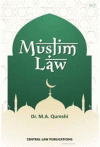- Author(s): Dr. M.A. Qureshi
- Publisher: Central Law Publications
- Edition: 6 Ed 2020
- ISBN 13 9789388267885
- Approx. Pages 699 + Contents
- Format Paperback
- Approx. Product Size 24 x 16 cms
- Delivery Time 3-5 working days (within Kerala & South India) (Others 7-9 days)
- Shipping Charge Extra (see Shopping Cart)
............................................................................................................................
Description
is the Sixth edition of the book entitled 'Muslim Law'. From time immemorial political philosophers have cherished the dream that they could improve mankind if only they could change the family system. Whenever thinkers have envisioned the ideal society, they have placed their ideal of family behaviour as its center. Islamic law is a complete code. It deals with all aspects of human life. In Islam males and females are equal. Islam has never asserted that woman is inferior to man. It has only made the point that woman is differently constituted. Islam says women be treated in accordance with their nature. Their delicate emotional constitution should always be borne in mind. Islam actually gives equal status to women as that of men. The Quran says, you are members one of another. They are equal in respect but different in role. All Muslims must not have four wives. Contrary to the contrary perception, monogamy is the rule in Islam and polygamy only an exception. In terms of the birth rate, men and women are almost equal in number, However, subsequently for a variety of reasons the number of men in society decreases, leaving an excess of women. Now the question is as to what should be the solution to this problem. The choice is not between monogamy and polygamy but rather between the lawful polygamy of Islam or the illicit polygamy of non-Islamic peoples.
............................................................................................................................
Contents
Chapter 1: Prophet Mohammad and Basic Principles of Islam
Chapter 2: Sources of Muslim Law
Chapter 3: Application of Muslim Law in India
Chapter 4: The Sects, Sub-sects and Different Communities Amongst Indian Muslims
Chapter 5: Concept of Law, Difinition of a Muslim and Conversion into islam
Chapter 6: Marriage (Nikah)
Chapter 7: Dower (mahr)
chapter 8: Judicial Separation and Restitution of Conjugal Rights
Chapter 9: Divorce - Talaq
Chapter 10: Maintenance (Nafqah)
Chapter 11: Minority and Guardianship
Chapter 12: Acknowledgment of Paternity, Maternity and Law of Adoption
Chapter 13: Law of Gift (Hiba)
Chapter 14: Law of Will and Legacies
Chapter 15: Law of Pre-emption
Chapter 16: Law of Succession
Chapter 17: Law of Waqf in India
Appendix: The Waqf Act, 1995
............................................................................................................................

